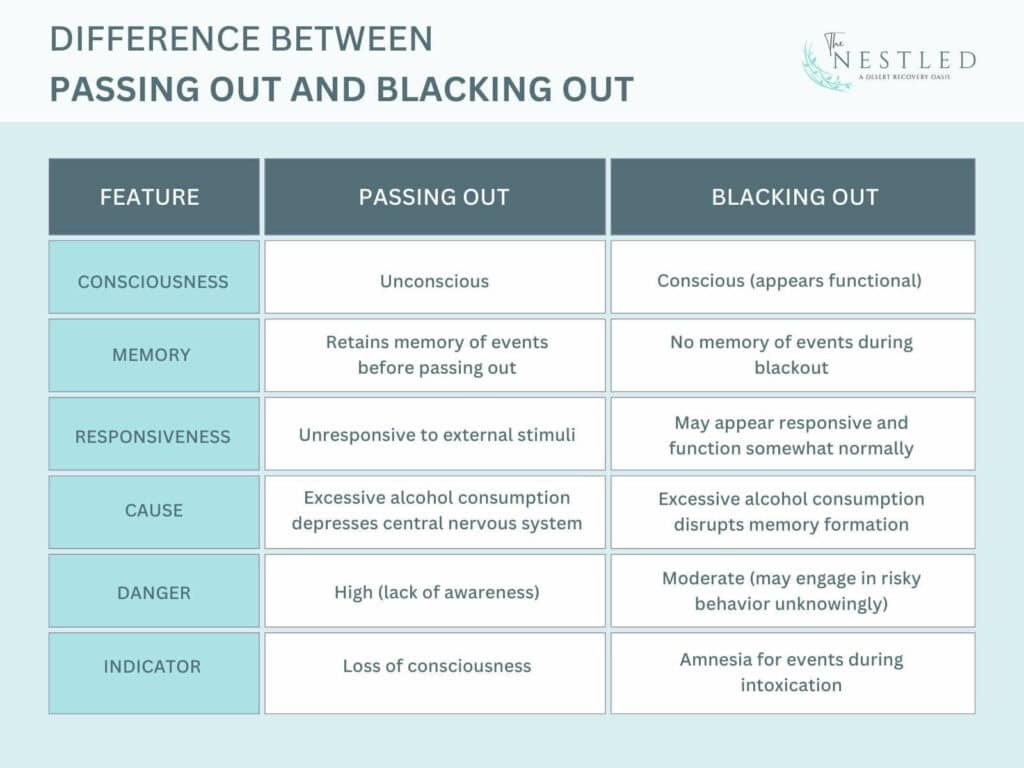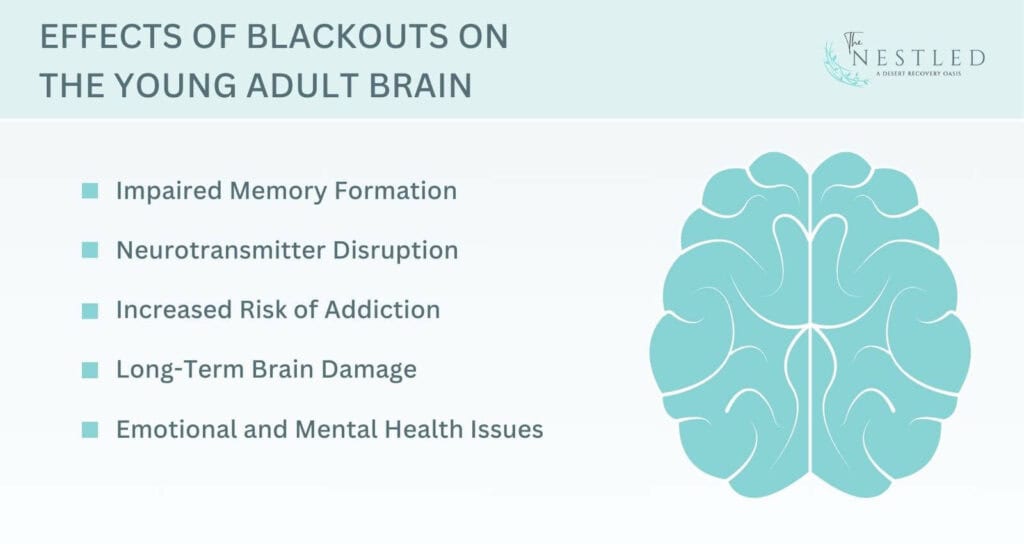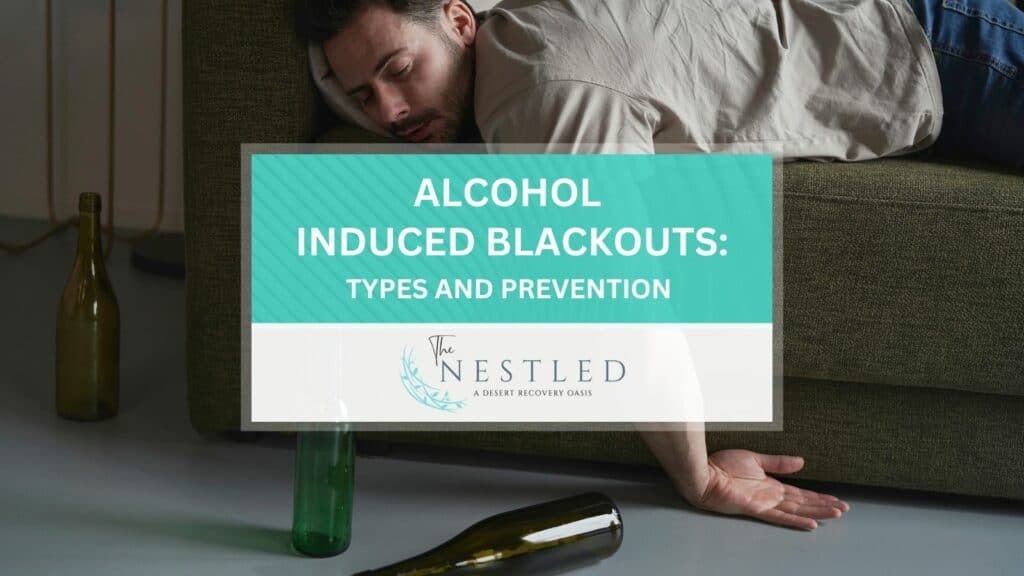Alcohol-induced blackouts are periods of amnesia where a person cannot remember events that happened while they were intoxicated. During a blackout, the brain fails to form new memories due to high levels of alcohol in the bloodstream. The American Addiction Centers reports that approximately 50% of people that drink alcohol experience blackouts at some point in their lifetimes.
The two main types of alcohol-induced blackouts recognized by the National Institutes of Health, these are: partial and complete blackouts. Partial blackouts involve gaps in memory where the person recalls some, but not all, events with prompting. Complete blackouts involve total amnesia for events that occurred while intoxicated, with no memory retrieval possible, even with cues.
Causes of blackouts include consuming large amounts of alcohol in a short time and drinking on an empty stomach, genetics, tolerance levels, and drinking history. Blackouts occur when there is a rapid increase in blood alcohol concentration (BAC) to levels that impair the brain’s ability to create and store new memories.
The dangers of blackouts include engaging in risky behaviors without recollection, such as unprotected sex, driving under the influence, or aggressive actions. These behaviors lead to accidents, legal issues, and physical harm. Long-term consequences include potential brain damage, increased vulnerability to addiction, and severe health complications.
Ways to prevent blackouts to drink in moderation and know personal limits. Consuming food before and while drinking helps slow alcohol absorption. Staying hydrated and pacing alcohol intake over time reduces the likelihood of reaching high BAC levels that cause blackouts.
What are Blackouts?
The American Addiction Centers define blackouts as periods of memory loss where an individual is incapable of remembering events that occurred while they were intoxicated. According to the National Institute on Alcohol Abuse and Alcoholism (NIAAA), alcohol-induced blackouts refer to “gaps” in a person’s memory for events that occurred while they were intoxicated.
Unlike passing out or losing consciousness, individuals experiencing a blackout remain awake and appear to function normally. Still, their brains do not record memories of their actions and experiences during that time.
This memory loss is due to alcohol’s impact on the hippocampus, a region of the brain crucial for forming new memories. The fast increase in blood alcohol concentration (BAC) interrupts the brain’s ability to form new memories.
Drinking large amounts of alcohol, especially on an empty stomach, significantly raises BAC levels and the likelihood of blackouts, according to the National Institute on Alcohol Abuse and Alcoholism. The resultant effect can be life-threatening.
Blackouts pose numerous dangers, both immediate and long-term. During a blackout, individuals engage in risky behaviors without any recollection. Over time, repeated blackouts result in lasting brain damage, increased susceptibility to alcohol dependence, and various health issues.
What are The Different Types Of Blackouts?
According to the American Addiction Center, there are two different types of blackouts: fragmentary blackouts and complete blackouts. Each type has distinct characteristics and impacts on memory.
Fragmentary Blackouts (Brownouts)
Fragmentary blackouts, often referred to as brownouts, involve partial memory loss. In these, the individual can recall some events with prompting. According to the NIAAA, “fragmentary blackouts” are characterized by spotty memories of events.
During a fragmentary blackout, the brain fails to fully consolidate memories, resulting in gaps that are filled in when reminded of certain details. These gaps in memory range from minor omissions to significant periods, but some context or cues help the person remember parts of the events that occurred.
Complete Blackouts
Complete blackouts involve total amnesia for the duration of the blackout period. In this state, the brain’s ability to form new memories is entirely shut down, meaning the individual will have no recollection of what happened during the blackout, regardless of any prompts or cues.
According to NIAAA, complete amnesia often spans hours; with this severe form of blackout, memories of events do not form and typically cannot be recovered. It is as if the events simply never occurred.
Complete blackouts typically occur when blood alcohol concentration (BAC) levels are extremely high, causing severe disruption to the brain’s hippocampus region responsible for memory formation.
Both types of blackouts result from the rapid increase in BAC, which impairs the brain’s ability to encode and store new memories. Fragmentary blackouts might seem less severe because some memories are retrieved, but they still indicate significant impairment. Complete blackouts are more alarming, as they suggest a total failure of the brain’s memory system during the period of intoxication.
What Is The Difference Between Passing Out And Blacking Out?

Passing out involves losing consciousness and becoming unresponsive, while blacking out involves remaining conscious but experiencing amnesia for events that occurred while intoxicated.
According to NIAAA, blackout is not the same as “passing out,” which means either falling asleep or losing consciousness from drinking too much. Passing out and blacking out are both consequences of excessive alcohol consumption, but they refer to different experiences.
Passing out occurs when alcohol depresses the central nervous system to the point where the individual becomes unconscious. Blacking out, on the other hand, refers to a state where the person remains awake and appears to function normally, but their brain is unable to create new memories.
This state of unconsciousness in passing out is dangerous because the person lacks awareness and is unable to respond to external stimuli. Unlike passing out, a person in a blackout is still conscious and capable of engaging in activities, but they will have no memory of these actions later. Both passing out and blacking out indicate significant levels of intoxication and pose serious health risks.
What Happens To The Brain On Blackouts?
During blackouts, the brain fails to form new memories due to the high levels of alcohol disrupting normal brain function. The National Institute of alcohol abuse and Alcoholism states that blackouts due to alcohol misuse can prevent the brain’s hippocampus from consolidating memories. This results in periods of amnesia where the individual cannot recall events that occurred while they were intoxicated.
The primary area affected during a blackout is the hippocampus, which is crucial for creating and storing new memories. Alcohol interferes with the activity of this brain region, preventing the transfer of information from short-term to long-term memory.
Consequently, even though a person in a blackout remains conscious and engages in activities, their brain does not record these events, leading to memory gaps. According to the National Institute of alcohol abuse and Alcoholism, these gaps happen when a person drinks enough alcohol to temporarily block the transfer of memories from short-term to long-term storage—known as memory consolidation—in a brain area called the hippocampus.
High blood alcohol concentration (BAC) is the main factor contributing to blackouts. This level of intoxication disrupts the normal functioning of neurotransmitters, particularly those involved in memory and learning, such as glutamate. This damage results in cognitive deficits, memory issues, and a risk of developing alcohol-related brain disorders.
What Happens To The Brain Of A Young Adult On Blackouts?
When a young adult experiences blackouts, their brain’s ability to transfer memories from short-term to long-term storage is impaired due to high levels of alcohol in the body. As the NIAA explains, even a small amount of alcohol can cause subtle memory impairment while a person is drinking. The more alcohol a person consumes, the more significant the memory impairment.

Five things that happen to the brain of a young adult on blackouts are impaired memory formation, neurotransmitter disruption, risk of addiction, mental health issues, and long-term brain damage.
- Impaired Memory Formation: Blackouts prevent the hippocampus from creating new memories, resulting in gaps in recall. This disruption affects academic performance and daily functioning.
- Neurotransmitter Disruption: Alcohol alters the balance of neurotransmitters like glutamate and GABA, which are critical for memory and learning. This imbalance leads to long-term cognitive issues if blackouts occur frequently.
- Increased Risk of Addiction: Young adults who experience blackouts have a higher risk of developing alcohol dependence. The brain’s reward system becomes altered, making it more difficult to control drinking behaviors.
- Long-Term Brain Damage: Repeated blackouts cause lasting damage to the brain’s structure and function. This includes potential shrinkage of brain regions involved in memory and decision-making, leading to persistent cognitive deficits.
- Emotional and Mental Health Issues: Blackouts contribute to emotional instability, anxiety, and depression. The stress of not remembering events exacerbates these mental health problems, affecting overall well-being.
What Causes A Blackout?
Five causes of a blackout are high blood alcohol concentration, binge drinking, drinking on an empty stomach, mixing alcohol with other substances, and individual factors.
According to the Centers for Disease Control, blackouts usually occur when your BAC is 0.16% or higher, which often happens when people ingest alcohol too quickly. Their bodies aren’t able to effectively process it out of their systems.
- High Blood Alcohol Concentration (BAC): The primary cause of blackouts is a high BAC. When alcohol is consumed quickly, the liver cannot metabolize it fast enough, causing BAC to rise rapidly. Elevated BAC interferes with the normal functioning of the brain’s hippocampus, which is responsible for memory formation.
- Binge Drinking: Engaging in binge drinking or consuming a large quantity of alcohol in a short time (typically five or more drinks for men and four or more for women within two hours) significantly increases the risk of blackouts. This pattern of drinking overwhelms the brain and disrupts its ability to create new memories.
- Drinking on an Empty Stomach: taking alcohol on an empty stomach accelerates its absorption into the bloodstream, leading to a quicker spike in BAC. Without food to slow the absorption process, the effects of alcohol on the brain intensify, making blackouts more likely.
- Mixing alcohol with drugs: mixing alcohol with other substances, especially depressants like benzodiazepines or opioids, amplifies its effects and increases the likelihood of blackouts. These substances synergistically enhance the impairing effects of alcohol on the brain.
- Individual Factors: Genetic predisposition, tolerance levels, and previous drinking history also play a role in the likelihood of experiencing blackouts. Some individuals are more susceptible to blackouts due to their genetic makeup or lower tolerance to alcohol’s effects.
What Are The Dangers Of Blacking Out?
Four dangers of blacking out include risky behaviors, physical injuries, legal issues, and long-term brain damage. According to the National Institute for alcohol abuse and Alcoholism, alcohol-induced blackouts can lead to impaired memory of events that transpired while intoxicated and a drastically increased risk of injuries and other harms.
These risks arise because individuals are unable to recall their actions during the blackout period, leading to potentially hazardous situations.
Risky Behaviors
During a blackout, individuals may undertake risky behaviors such as unsafe sex, drunk driving, or getting into physical altercations. Since they have no memory of these actions, they cannot account for the potential consequences, which lead to serious health issues, accidents, or criminal charges.
Physical Injuries
The lack of memory and impaired judgment during a blackout increases the likelihood of physical injuries. Individuals are more prone to falls, accidents, and other injuries because their motor skills and coordination are significantly impaired. These injuries vary from minor cuts to severe trauma requiring medical attention.
Legal Issues
Engaging in illegal activities during a blackout, such as driving while intoxicated, can result in legal repercussions. Individuals may face fines, arrest, or imprisonment without any recollection of the events leading to these consequences. Legal issues can have long-lasting impacts on personal and professional life, including loss of driving privileges and a criminal record.
Long-term Brain Damage
Frequent blackouts cause long-term damage to the brain, particularly the hippocampus, which is essential for memory formation. Chronic heavy drinking that leads to repeated blackouts results in cognitive deficits, memory problems, and an increased risk of developing alcohol-related brain disorders. This long-term damage significantly impacts an individual’s quality of life and mental functioning.
Who Is at the Most Risk Of Blacking Out
Anyone is at risk of blacking out if their blood alcohol concentration gets to 0.16 percent, but blackouts also occur when lower bac levels of people take alcohol with other substances. People at the most risk of blacking out include;
- Binge drinkers
- Young adults and teenagers
- Individuals with low tolerance to alcohol
- People with a family history of Alcoholism
- Women
- Those consuming alcohol on an empty stomach
- Individuals mixing alcohol with other drugs or medications
How To Prevent Blackouts?
The primary way to prevent blackouts is by drinking in moderation or abstaining from alcohol. According to the CDC, you can avoid blackouts by doing the following;
- Drink in moderation
- Eat before and while drinking
- Stay hydrated
- Avoid binge drinking
- Pace your alcohol consumption
- Know your limits
- Avoid mixing alcohol with other substances
- Choose drinks with lower alcohol content
- Alternate alcoholic drinks with non-alcoholic beverages
- Monitor your drinking environment and avoid high-risk situations
Are Blackouts A Sign Of An Alcohol-Related Problem?
Blackouts are an indication of an alcohol-related problem. Experiencing blackouts indicates that an individual is consuming alcohol at levels that severely impair brain function, preventing the formation of new memories.
According to the National Institute of Alcohol Abuse and Alcoholism, blackouts are not necessarily a sign of alcohol use disorder, but experiencing even one is a reason for concern and should prompt people to consider their relationship with alcohol and talk to their healthcare provider about their drinking.
This level of consumption suggests problematic drinking patterns, such as binge drinking or alcohol dependency. Frequent blackouts not only signal acute alcohol-related issues but also pose significant risks to long-term brain health and overall well-being. Recognizing blackouts as a warning sign is crucial for addressing and managing alcohol consumption effectively.
What Happens To The Body During A Blackout?
During a blackout, the body continues to function normally, but the brain fails to form new memories due to high levels of alcohol consumption. This leads to periods of amnesia where the individual cannot remember events that happened while they were intoxicated.
Although the person remains conscious and appears to be functioning, their cognitive abilities and motor skills are significantly impaired.
What Does Blacking Out Feel Like?
While in a blackout, you might feel disoriented or confused, but you often seem to be acting relatively normal to others around you. You might continue to interact with people, move around, and perform tasks, but without your brain forming new memories. This memory loss causes an upsetting experience when you later realize you cannot remember significant portions of time.
Upon coming out of a blackout, you might hear about things you said or do from others or find evidence of your actions, like text messages or purchases, that you have no recollection of. This realization can be unsettling and can lead to anxiety and regret over actions taken while in this state.
What is the Difference Between a Blackout and Passing Out?
Blacking out and passing out are two different consequences of excessive alcohol consumption. According to the NIAAA, blacking out involves remaining conscious and active but experiencing amnesia for events that occurred while intoxicated. This means the individual appears to function normally but cannot form new memories during the blackout period. For more detailed information on the impacts of alcohol, you can explore topics related to alcohol and brain.
Passing out, on the other hand, involves losing consciousness entirely and becoming unresponsive. This state is dangerous as it can result in the individual being unaware of their surroundings and unable to respond to emergencies. Both blacking out and passing out indicate severe levels of intoxication and pose significant health risks. If these issues occur frequently, it may be necessary to seek help through drug addiction rehab.

Share This Post




